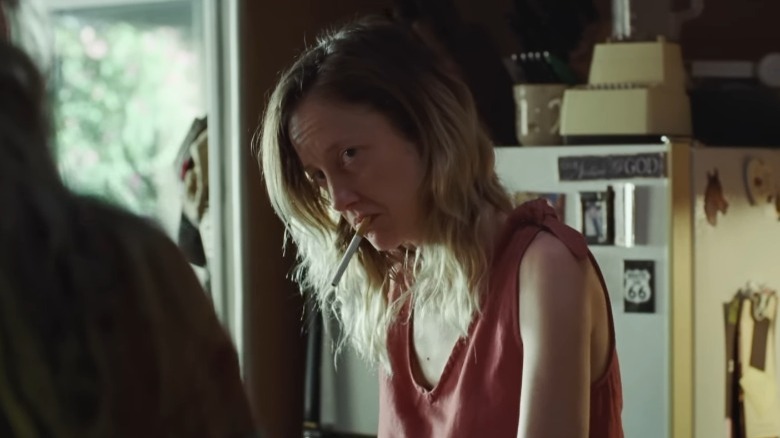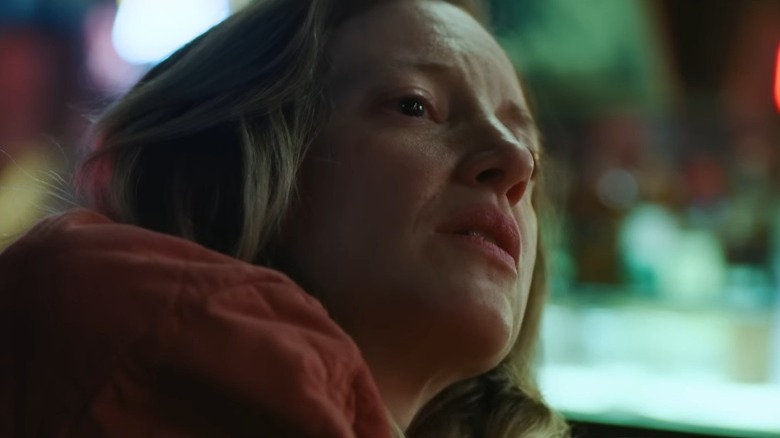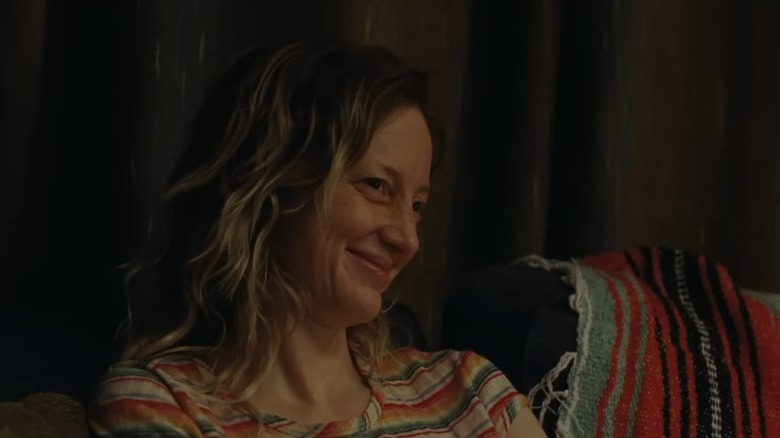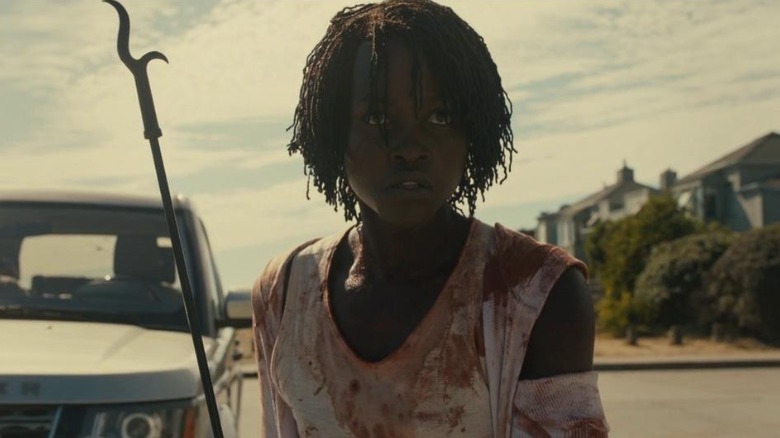Not Everyone Is Happy About Andrea Riseborough's Hard-Won Oscar Nomination
The nominations for the 95th Academy Awards are in, and a lot of the expected shoo-ins have confirmed their season-long favoritism — from acclaimed prestige dramas like "Tár" and "The Fabelmans" to tech category juggernauts like "Avatar: The Way of Water" and "Top Gun: Maverick," with "Everything Everywhere All at Once" unsurprisingly leading the pack at 11 total nominations. In the ever-buzzy Best Actress category, things shook out more or less as expected: odds-on favorites Cate Blanchett (for "Tár") and Michelle Yeoh (for "EEAAO") will, indeed, go head-to-head for the big trophy. Meanwhile, Ana de Armas has proven that the strength of her acting in "Blonde" could overcome even the film's very mixed reception, and Universal Pictures' controversial decision to campaign Michelle Williams as a leading actress for "The Fabelmans" has paid off with another nod for one of the most gifted American actors working.
One nomination, however, was decidedly more on the "shocker" side. Industry veteran Andrea Riseborough has received a nomination for her fearless, emotionally arresting performance as recovering alcoholic Leslie Rowlands in "To Leslie" — a low-budget indie drama that barely made a blip during its simultaneous theatrical and streaming run, earning just over $20,000 at the box office and receiving relatively little fanfare from critics or other award bodies. And, while many are celebrating the wildcard nature of Riseborough's nod and its injection of excitement into awards season, some are also questioning the nature of her campaign and what it says about the state of Hollywood.
Riseborough's nod seemingly resulted from a concentrated push among the actors' branch
Awards season is a months-long affair, which usually requires that contenders run belabored campaigns full of strategic PR and heavy financial investment in order to keep their chances alive. So it baffled many film buffs when a runaway train of enormous industry buzz suddenly began to run for Andrea Riseborough just a couple of weeks prior to the unveiling of Oscar nominations — and for a film that, by all accounts, had zero cash to spend on campaigning.
As untangled by IndieWire and Deadline, it turns out that Riseborough's no-budget campaign got a little help from her friends. Despite her lack of A-list status, Riseborough is an incredibly talented and versatile workhorse who has been doing stellar film and TV work and making connections for nearly two decades now — and it doesn't hurt that she's represented by the almighty CAA, either. Ergo, from December 2022 onward, Riseborough and her management began to self-fund a word-of-mouth campaign based entirely on getting the movie out to influential actors who could sway the Academy's acting branch.
"To Leslie" had screenings hosted by Jennifer Aniston, Charlize Theron, Sarah Paulson, Gwyneth Paltrow, and Courteney Cox (via The Hollywood Reporter), plus Q&As moderated by the likes of Amy Adams and Kate Winslet, the latter of whom notably called Riseborough's work "one of the greatest performances I have ever seen in my life." And all that momentum built up just as Oscar voting was underway.
Some feel that the nomination was about connections in addition to mere talent
The number of actors who joined in on the Andrea Riseborough hype train is frankly astonishing. Those who spoke glowingly of the performance in recent weeks include Jane Fonda, Frances Fisher, Mia Farrow, Mira Sorvino, Kim Basinger, Michelle Monaghan, Bradley Whitford, Susan Sarandon, Naomi Watts, Sally Field, Laura Dern, Liam Neeson, Demi Moore, Geena Davis, Minnie Driver, Debra Winger, Zooey Deschanel, Melanie Lynskey, Helen Hunt, Alan Cumming, Pedro Pascal, Ed Harris, Patricia Clarkson, Mary Louise Parker, Ellen Barkin, Jennifer Garner, Demián Bichir, Catherine Keener, and many others (via The Playlist). It's the most concentrated — and, as of today, successful — grassroots campaign for an acting Oscar nod since Sally Kirkland's legendary nomination for "Anna" in 1988.
But some critics and movie fans on social media are questioning whether it can really be called a "grassroots" campaign at all — especially seeing as two actresses heretofore considered locks for a nomination, Viola Davis in "The Woman King" and Danielle Deadwyler in "Till," both ended up getting left by the wayside. While nobody is disputing the strength of Riseborough's performance in and of itself, the campaign's nature did raise eyebrows. As film critic Robert Daniels noted, "Black women quite literally never get that campaign. And are always harmed." Several viral post-announcement tweets straight-up described the whole thing as, essentially, a bunch of white actors getting together to snatch away two Black women's places and hand it over to their well-connected CAA friend.
Criticism is focused on the structural issue, as opposed to Riseborough herself
As the backlash built up on Twitter, several critics offered opposing takes — such as Brian Tallerico, who wrote, "I'm baffled by people who look at the Riseborough thing as somehow 'less ethical' or organic than studios who spend small fortunes on parties and events to push their nominees and literally buy their way there." But the very fact that Riseborough didn't have to go to all that trouble, while the likes of Viola Davis and Danielle Deadwyler did and still missed out, is arguably what's fueling the backlash. Overall, skepticism has been targeted more at the structural issue at hand than at Andrea Riseborough and her performance specifically.
It is well-established at this point that the Oscars are very, very bad at recognizing Black actresses in lead roles. Performers like Davis and Deadwyler face an uphill battle to even get on the industry's radar — which is why they need to work heavy-hitting campaigns in order to have a shot. The idea that nominations could ultimately be determined by nothing more than peer-to-peer enthusiasm adds yet another hurdle for actresses of color, who are much less likely to be well-connected and chummy with A-listers the way Riseborough apparently is. Danielle Deadwyler, after all, is also an underrated stage and screen veteran who finally got a role to showcase all her brilliance in 2022 — but, when push came to shove, her peers didn't turn out for her the way they did for Riseborough.
The nomination changes the future of Oscar campaigning, and raises question marks about its past
The fact that the actors' branch has had this power all along — to simply get together and rally behind an incredible performance, money and buzz and Oscar blogging be damned — throws into sharp critique all the instances of actresses of color who missed out on nominations because they "never had a chance." As put by film critic Jillian Chilingerian, "The Andrea Riseborough nomination tells me that this entire time the actor's branch had the potential to award hidden gem performances and this is the first time they decided to do that."
Lupita Nyong'o's snub for "Us" is one particularly egregious example in recent memory, but, if Riseborough could get in for a film as underseen and under-discussed as "To Leslie," there's no reason why the stars couldn't have aligned for numerous other performers. From Alfre Woodard in "Clemency" to Regina Hall in "Support the Girls" to Awkwafina in "The Farewell" to Adepero Oduye in "Pariah" to Rinko Kikuchi in "Kumiko the Treasure Hunter" (and that's just limiting it to American films), the number of extraordinary performances that could have benefited from a Riseborough-style push in recent years is really as big as the imagination allows — heck, we had Tang Wei in "Decision to Leave" just this year.
Going forward, Riseborough's nomination is likely to radically transform Oscar campaigning, but it remains to be seen whether the benefit of such passionate pushes will be truly equal-opportunity.




